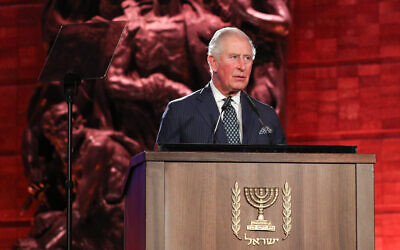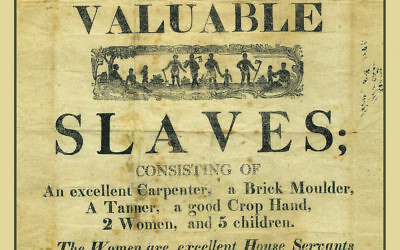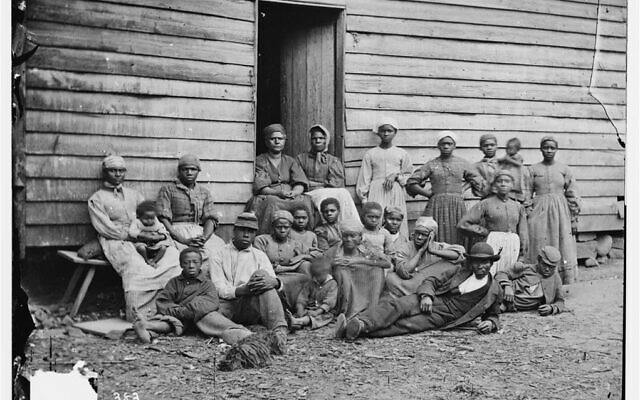Slavery and the Shoah – Prince Charles sparks an important debate
His comments about putting the teaching of slavery on equal footing with the Holocaust in British schools provoked widespread reaction from educators.
Jenni Frazer is a freelance journalist
Prince Charles’s comments about putting the teaching of slavery on equal footing with the Holocaust in British schools provoked widespread reaction this week from Holocaust educators.
Speaking to the heads of Commonwealth governments in the Rwandan capital, Kigali, the prince said that slavery was “the most painful period of our history”, adding that he could not “describe the depths of my personal sorrow at the suffering of so many, as I continue to deepen my own understanding of slavery’s enduring impact”.
A royal source told the Sunday Times that the prince was consulting “world leaders and lots of different people” on the subject of Britain’s slavery crimes, which he wants to make an educational priority.

The source added: “He is patron of the Holocaust Memorial Day Trust and notes that in the UK we now know and learn at school all about the Holocaust, so it is something that is acknowledged at a national level. That is not true of the transatlantic slave trade. Maybe that is something that should be.”
The source also told the newspaper that the prince was “not dictating education policy” but acknowledging “that it needs to happen. So, just like the Holocaust Memorial Day, is there some way of doing that? Having a moment, having a way of remembering that?”
In fact, slavery does feature on the National Curriculum, but is suggested as one of a number of examples to be studied during the historical period of 1745 to 1901, the time of the British Empire. The Holocaust remains the only subject on the National Curriculum which is compulsory for secondary school students, which has been the case since 1991.
Additionally, not every school teaches the National Curriculum: academies, free schools and private schools do not follow it.

Although a number of Jewish organisations working in the Holocaust sector agreed there should be improved teaching about slavery, there was reluctance to say the subject should be awarded parity with the study of the Holocaust, which many members of the community believe should retain unique status.
The Holocaust Memorial Day Trust, of which Prince Charles is patron, said his comments in Rwanda “showed once again his profound commitment to helping people learn where identity-based persecution has led in the past”.
The prince, the HMDT statement continued, had “rightly urged greater awareness of slavery. The transatlantic slave trade is an important part of British history, of humanity’s history and must be continued to be taught, studied and learnt from.
“We are pleased that many schools in the UK do teach this important history. Like the Prince of Wales, we think it is important to understand more about slavery and it is positive that he encourages greater awareness of identity-based prejudice.
“On Holocaust Memorial Day we remember the six million Jews murdered during the Holocaust, alongside the millions of other people killed under Nazi persecution of other groups and in genocides that followed in Cambodia, Rwanda, Bosnia and Darfur. Together we bear witness for those who endured genocide, and honour the survivors and all those whose lives were changed beyond recognition”.
Tim Robertson, chief executive of the Anne Frank Trust, said: “We think that the Holocaust and slave trade are both vital to be taught in schools. We still know, however, that there are lots of misunderstandings and ignorance about the Holocaust, so we need to get better teaching about it – as well as better teaching about slavery”.
Robertson said that he was in favour of parity “in terms of emphasis. But though there are some similarities between the slave trade and the Holocaust – they both led to the enslavement and murder of millions of people on the basis of race – there are huge differences as to how they were done, what the motivation was and how societies dealt with them.
He added: “It’s very important that when those things are taught in schools that the students learn about the nuances and differences between them”. Nevertheless, Robertson said he believed slavery should also be compulsory on the National Curriculum.
It’s very important that when those things are taught in schools that the students learn about the nuances and differences between them
The Anne Frank Trust, Robertson said, taught about all forms of prejudice, drawing on the teenager’s story. It had run workshops on antisemitism, Islamophobia, Gypsy and Roma traveller discrimination, homophobia and transphobia. “Education is a balance of making connections and understanding differences.”
Marc Cave, director of the Nottinghamshire-based National Holocaust Centre and Museum, said it was “essential people understand how the slave trade came about. But I also think that it is important such understanding of slavery is integrated with learning about the Holocaust, not pitted against each other.”
Cave added: “I think we are naive if we think it is right to ignore the pent-up demand for education [about slavery], but I don’t think it is wise to suggest that slavery and the Holocaust are the same.
“It would be great to have on the National Curriculum the fake race science, which absolutely was an engine of Empire thinking, developed by English and American academia, which created this hierarchy of racial superiority — the white man at the top and Jews and blacks inferior. It was one of the strong reservoirs Hitler and the Third Reich fished in to arrive at their own ideology.”
We are naive if we think it is right to ignore the pent-up demand for education about slavery.
But Cave was “all in favour” of a separate memorial day to mark “what had been done to black people over the centuries. There needs to be a focus for this exploration of the slave trade, not only because it is morally right, but also because there doesn’t seem to be a natural sort of conduit for this sort of conversation at an official level in the black community. There should be”.
There was criticism for Prince Charles, however, from black Jewish journalist Stephen Bush, who produced the Board of Deputies ground-breaking report on racial inclusivity last year.
Bush told Jewish News: “I think, as a historian, it’s in practice impossible to meet the KS3 requirement to teach empire, industry and its impact on the UK well, without slavery, so I am dubious that it isn’t on there in practice.
“Prince Charles’ justification for including it is an ill-judged one. The primary purpose of the history curriculum at school level is to equip people to understand the UK and the world, rather than whatever grim calculus the prince’s remarks seem to apply.
“One reason why my report, like every single report into race in the UK, including the recent Sewell Report, recommended teaching our diverse history is that people should be able to understand why the largest UK minority group is from the Indian subcontinent, why and how Caribbean people came to the UK, and so forth. In general the argument to have the slave trade on the history curriculum is that is of global and national significance, like the Reformation and indeed everything else we try to cram in there — not that it was an atrocity [to be compared with the Holocaust]”. Bush added that he deplored the idea of “an atrocity-off” between the two events.
He said he did not regard the prince’s remarks as “particularly helpful” but did say there was an argument for putting together a “fixed museum” about slavery, not least because so many artefacts relating to the Empire and the slave trade remain in private hands.
Between 1662 and 1807, Britain sold an estimated 3,415,500 people into slavery. Around half a million did not survive the ‘middle passage’ transatlantic journey. The trade was the largest forced migration in human history.

Thank you for helping to make Jewish News the leading source of news and opinion for the UK Jewish community. Today we're asking for your invaluable help to continue putting our community first in everything we do.
For as little as £5 a month you can help sustain the vital work we do in celebrating and standing up for Jewish life in Britain.
Jewish News holds our community together and keeps us connected. Like a synagogue, it’s where people turn to feel part of something bigger. It also proudly shows the rest of Britain the vibrancy and rich culture of modern Jewish life.
You can make a quick and easy one-off or monthly contribution of £5, £10, £20 or any other sum you’re comfortable with.
100% of your donation will help us continue celebrating our community, in all its dynamic diversity...
Engaging
Being a community platform means so much more than producing a newspaper and website. One of our proudest roles is media partnering with our invaluable charities to amplify the outstanding work they do to help us all.
Celebrating
There’s no shortage of oys in the world but Jewish News takes every opportunity to celebrate the joys too, through projects like Night of Heroes, 40 Under 40 and other compelling countdowns that make the community kvell with pride.
Pioneering
In the first collaboration between media outlets from different faiths, Jewish News worked with British Muslim TV and Church Times to produce a list of young activists leading the way on interfaith understanding.
Campaigning
Royal Mail issued a stamp honouring Holocaust hero Sir Nicholas Winton after a Jewish News campaign attracted more than 100,000 backers. Jewish Newsalso produces special editions of the paper highlighting pressing issues including mental health and Holocaust remembrance.
Easy access
In an age when news is readily accessible, Jewish News provides high-quality content free online and offline, removing any financial barriers to connecting people.
Voice of our community to wider society
The Jewish News team regularly appears on TV, radio and on the pages of the national press to comment on stories about the Jewish community. Easy access to the paper on the streets of London also means Jewish News provides an invaluable window into the community for the country at large.
We hope you agree all this is worth preserving.






















